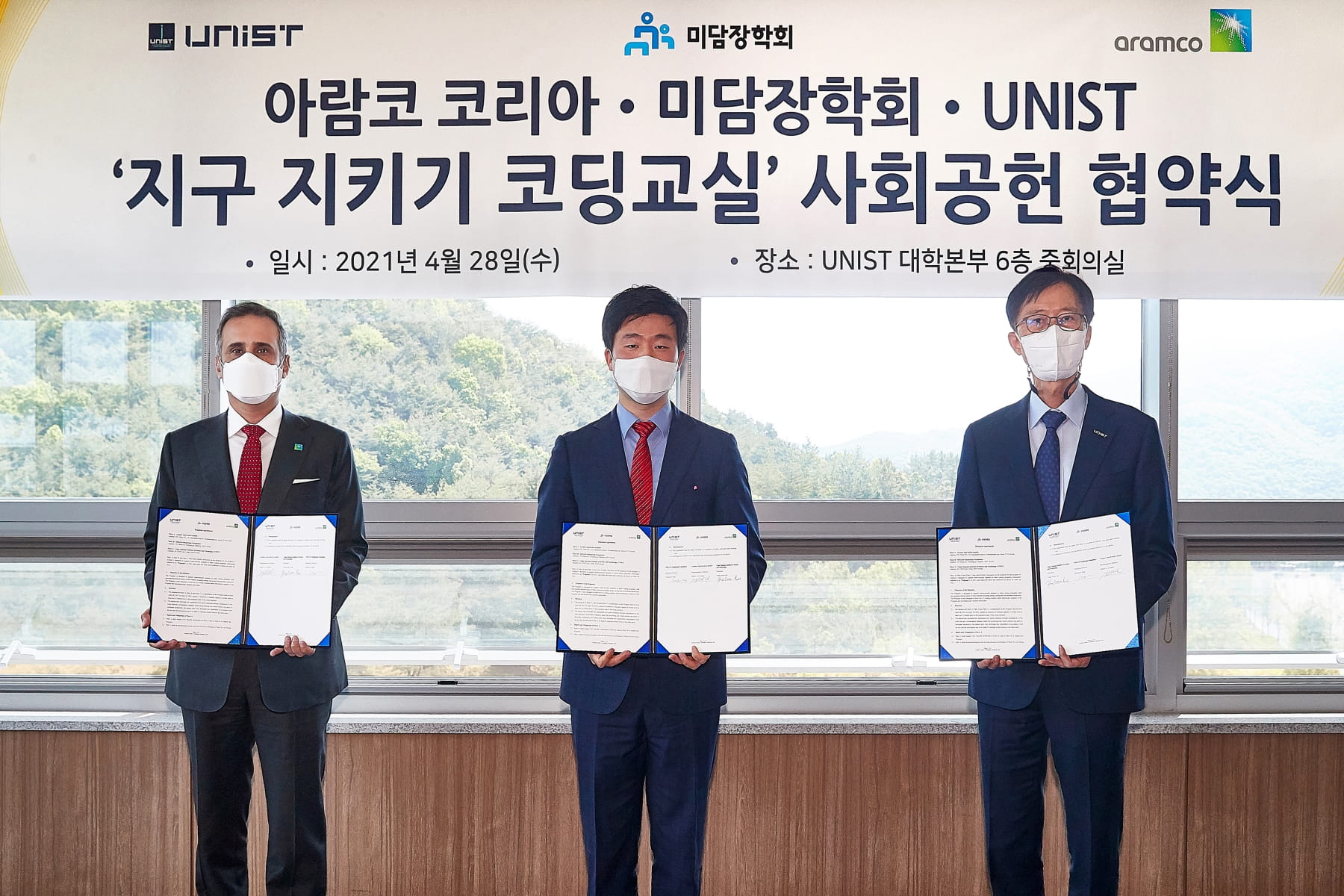Aramco Korea extends coding education program for a second year

Photo caption (from left): Aramco Korea Representative Director Mutib A. Al-Harbi, MIDAM Standing Director Neung-in Jang, and UNIST President Yong-hoon Lee signed a partnership agreement for the “Aramco Coding School,” at UNIST in Ulsan.
-
In partnership with leading universities, including the Ulsan National Institute of Science and Technology, Aramco Korea supports educational programs for lower-income elementary and middle school students for a second year.
-
Aramco Coding School is a comprehensive and in-depth coding program where students learn to develop computer applications themed around environmental protection, by using 3D printers and tablet PCs.
-
Aramco Korea also plans to hold the Aramco Coding Hackathon and Aramco Coding Worldcup, nationwide coding competitions for everyone, including non-beneficiaries of the educational program, to help them practice their computational and algorithmic thinking.
Aramco Asia Korea, (Aramco Korea), a fully-owned subsidiary of Aramco, announced a partnership with the MIDAM Scholarship Foundation (MIDAM) and the Ulsan National Institute of Science and Technology (UNIST) to continue the Aramco Coding School, a second-year computer programming class that teaches coding to lower-income elementary and middle school students.
The partnership was signed in a ceremony at UNIST in Ulsan, attended by Mutib A. Al-Harbi, Representative Director of Aramco Korea; Neung-in Jang, Standing Director of MIDAM; and Yong-hoon Lee, President of UNIST.
As part of its citizenship initiatives in Korea, Aramco Korea launched the charitable coding education program last year to bridge the educational gap in computer science among elementary and middle school students, in collaboration with leading universities, including UNIST and the Korea Advanced Institute of Science and Technology (KAIST). Aramco Korea is rolling out the program this year to Ulsan, Daejeon, and the Seoul metropolitan area to make the program accessible to more students.
Students will take 20 computer programming classes, including Xcode·Android Studio application building and Swift framework-based application development. They will also be educated on the principles of climate change, environmental issues and the benefits of eco-friendly energy. Based on these lessons, students will then receive instruction on developing their own computer applications for environmental protection using 3D printers and tablet PCs.
The Aramco Coding Hackathon and Aramco Coding Worldcup, nationwide competitions also open to non-beneficiaries of the program, will be held to encourage the students to practice their computational and algorithmic thinking.
“Learning computer science is becoming increasingly essential, as computers are going to be even more interwoven into the fabric of our future lives. We hope this meaningful program will empower the students to grow as future leaders to create the world of tomorrow. We are proud to team up with the MIDAM Scholarship Foundation and UNIST for this program, which is designed to make coding education more accessible to the less privileged students in our communities,” said Mutib A. Al-Harbi, Aramco Korea's Representative Director.
“Building on the successful execution of the program in 2020, we are pleased to continue this computer program, with more students joining this year. We will make our utmost efforts to operate the program to narrow the learning gap that had been widened by COVID-19,” said Neung-in Jang, MIDAM's Standing Director.
“This partnership comes at a critical time when the importance of environmental and artificial intelligence cannot be overemphasized. We are delighted to help young people in our communities through this program. We hope the program will serve as a valuable opportunity to boost students' interest in science and technology,” said Yong-hoon Lee, UNIST President.
Aramco, the majority shareholder of S-OIL and the second largest shareholder of Hyundai Oilbank, has been active in developing and advancing mutually beneficial business and technology partnerships with major Korean companies and research institutes.
The company has also been committed to supporting local communities in Korea by implementing a broad range of citizenship programs, including its COVID-19 relief aid for Korea, offering merit-based scholarships for university students with disabilities, and supporting the installation of solar power generation systems at welfare facilities.

